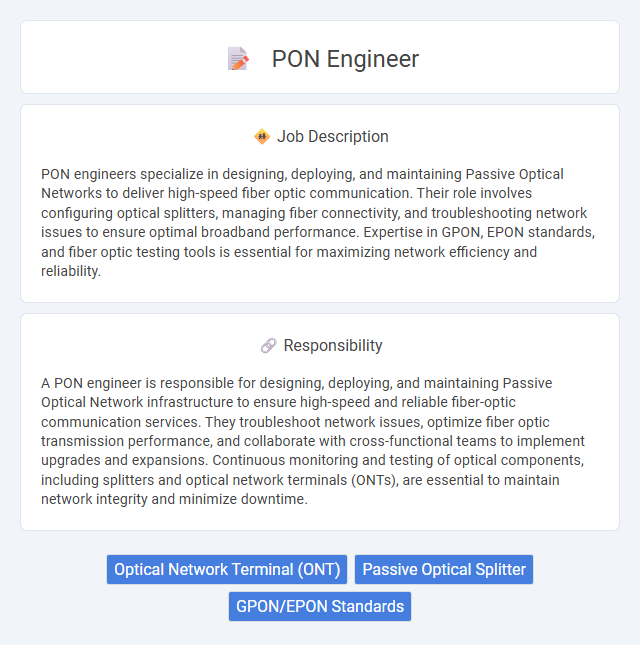
PON engineers specialize in designing, deploying, and maintaining Passive Optical Networks to deliver high-speed fiber optic communication. Their role involves configuring optical splitters, managing fiber connectivity, and troubleshooting network issues to ensure optimal broadband performance. Expertise in GPON, EPON standards, and fiber optic testing tools is essential for maximizing network efficiency and reliability.
PON engineers are likely to thrive in environments requiring strong problem-solving skills and attention to detail, as the job involves maintaining and optimizing fiber optic networks. Individuals comfortable with technology, working independently, and handling potential on-call situations may find this role particularly suitable. Those who struggle with fast-paced technical challenges or have difficulty adapting to evolving telecommunications systems might face challenges in this career.
Qualification
A PON engineer must possess a strong background in telecommunications and fiber optics, typically requiring a degree in electrical engineering, telecommunications, or a related field. Proficiency in designing, deploying, and maintaining Passive Optical Networks (PON), including GPON, EPON, and XG-PON technologies, is essential. Certifications such as Cisco CCNA or Fiber Optic Association (FOA) credentials enhance expertise and validate technical skills in fiber optic network engineering.
Responsibility
A PON engineer is responsible for designing, deploying, and maintaining Passive Optical Network infrastructure to ensure high-speed and reliable fiber-optic communication services. They troubleshoot network issues, optimize fiber optic transmission performance, and collaborate with cross-functional teams to implement upgrades and expansions. Continuous monitoring and testing of optical components, including splitters and optical network terminals (ONTs), are essential to maintain network integrity and minimize downtime.
Benefit
A PON engineer likely gains benefits such as competitive salaries and opportunities for career growth within the telecommunications industry. The role probably offers hands-on experience with cutting-edge fiber optic technologies, enhancing technical expertise. Job stability is often anticipated due to increasing demand for high-speed internet infrastructure worldwide.
Challenge
A PON engineer likely encounters complex challenges involving the design, installation, and troubleshooting of passive optical networks, requiring advanced technical skills and attention to detail. Problems related to signal loss, fiber splicing, and network scalability may frequently arise, demanding innovative solutions and continuous learning. The dynamic nature of telecommunications technology suggests that adapting to new standards and equipment will probably be a consistent aspect of the role's challenges.
Career Advancement
PON engineers specialize in designing and maintaining Passive Optical Networks, crucial for high-speed broadband infrastructure. Career advancement opportunities include roles such as Senior Network Engineer, Project Manager, and Optical Network Architect, which require expertise in fiber optics and network protocols. Gaining certifications like Cisco CCNP or FTTH Specialist significantly enhances prospects for leadership positions and higher salaries in telecom companies.
Key Terms
Optical Network Terminal (ONT)
PON engineers specialize in designing, deploying, and maintaining Passive Optical Network (PON) infrastructures, with a key focus on Optical Network Terminals (ONTs) that act as customer premises equipment converting optical signals into electrical signals for end-users. They ensure optimal ONT performance by configuring firmware, troubleshooting connectivity issues, and integrating ONTs with Optical Line Terminals (OLTs) for seamless broadband delivery. Expertise in ONT provisioning, signal quality assessment, and fiber optic technology standards like GPON and EPON is essential for maximizing network efficiency and customer satisfaction.
Passive Optical Splitter
A PON engineer specializes in the design, deployment, and maintenance of Passive Optical Networks, focusing on optimizing the performance of passive optical splitters that distribute optical signals to multiple endpoints without requiring power. Expertise in splitter types, ratios (e.g., 1:16, 1:32), and insertion loss metrics is critical to ensure signal integrity and network efficiency in fiber-to-the-home (FTTH) applications. Proficiency in managing optical budget calculations and troubleshooting splitter-related faults enhances overall network reliability and customer satisfaction.
GPON/EPON Standards
PON engineers specialize in designing, deploying, and maintaining Passive Optical Networks utilizing GPON (Gigabit Passive Optical Network) and EPON (Ethernet Passive Optical Network) standards to deliver high-speed broadband access. Their expertise includes configuring optical line terminals (OLT) and optical network units (ONU) to optimize bandwidth and ensure compliance with ITU-T G.984 and IEEE 802.3ah standards. Proficiency in troubleshooting signal loss, managing optical splitters, and upgrading network architectures is essential for maximizing network efficiency and service reliability.
 kuljobs.com
kuljobs.com